Food to Avoid After a Tummy Tuck
A tummy tuck, or abdominoplasty, is a popular cosmetic surgical procedure aimed at improving the appearance of the abdomen by removing excess skin and fat and tightening the underlying muscles. This procedure can lead to a significant transformation in one’s body contour, boosting confidence and enhancing overall aesthetics. However, to ensure optimal recovery and long-lasting results, it’s crucial to follow proper post-operative care instructions, including dietary guidelines. What you eat after a tummy tuck plays a vital role in your healing process, affecting not only the speed of recovery but also the overall success of the surgery.
In the immediate aftermath of a tummy tuck, your body needs essential nutrients to repair tissues, reduce inflammation, and fight off infections. While incorporating nutrient-rich foods is essential, it’s equally important to be aware of and avoid certain foods that could impede your recovery. Eating the wrong types of food can lead to complications such as increased swelling, delayed healing, and even gastrointestinal discomfort, which can all negatively impact your recovery journey.
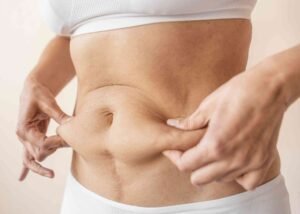
This blog aims to provide a comprehensive guide on what foods to avoid after a tummy tuck, helping you navigate your dietary choices during the critical post-operative period. By understanding the significance of proper nutrition and making informed food choices, you can ensure a smoother, faster recovery and maintain the desired results of your tummy tuck procedure. We’ll start by briefly exploring what a tummy tuck entails and then delve into the specifics of the dietary restrictions you should follow to achieve the best possible outcome. So, let’s embark on this journey towards a healthier recovery and a flatter, more toned abdomen.
Understanding Tummy Tuck (Abdominoplasty)
A tummy tuck, or abdominoplasty, is a surgical procedure designed to remove excess skin and fat from the abdomen while tightening the muscles of the abdominal wall. This procedure is often sought by individuals who have experienced significant weight loss, pregnancy, or simply have stubborn abdominal fat and loose skin that do not respond to diet and exercise. The goal of a tummy tuck is to create a smoother, firmer abdominal profile. Here are some key points about tummy tucks:
Types of Tummy Tucks:
Full Tummy Tuck: Involves an incision from hip to hip and around the navel, allowing for the removal of a significant amount of skin and fat, and the tightening of the abdominal muscles.
Mini Tummy Tuck: Involves a smaller incision and focuses on the area below the navel, suitable for individuals with less excess skin and fat.
Extended Tummy Tuck: Includes an extended incision to address loose skin and fat on the flanks or lower back as well.
Procedure:
- Incision: A horizontal incision is made between the pubic hairline and the navel. The length and shape of the incision depend on the amount of excess skin.
- Muscle Repair: The underlying abdominal muscles are tightened and sutured to create a firmer abdominal wall.
- Skin Removal: Excess skin is trimmed away, and the remaining skin is repositioned for a smoother appearance.
- Repositioning the Navel: In a full tummy tuck, the navel is repositioned to align with the new contours of the abdomen.
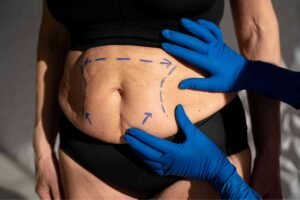
Recovery:
- Initial Recovery: The initial recovery period lasts about 1-2 weeks, during which swelling, bruising, and discomfort are common. Patients are advised to rest and avoid strenuous activities.
- Long-term Recovery: Full recovery can take several months, with patients gradually resuming normal activities and exercise as healing progresses. Adhering to post-operative instructions, including dietary guidelines, is crucial for optimal healing.
Potential Risks and Complications:
- Infection: Risk of infection can be minimized by following proper wound care instructions.
- Scarring: While scarring is inevitable, it can be minimized with proper care and, in some cases, treatments recommended by the surgeon.
- Seroma: Accumulation of fluid under the skin may occur and might require drainage.
- Long-term Results: To maintain the results of a tummy tuck, it’s important to follow a healthy lifestyle, including a balanced diet and regular exercise.
Foods to Avoid After a Tummy Tuck
Diet plays a crucial role in the recovery process after a tummy tuck. Certain foods can hinder healing, cause discomfort, and even lead to complications. Here’s a detailed look at foods to avoid to ensure a smooth and speedy recovery:
Processed Foods:
- High Sodium Content: Foods like chips, canned soups, and processed meats contain high levels of sodium, which can increase swelling and delay healing.
- Additives and Preservatives: These can cause inflammation and are generally unhealthy for your recovery.
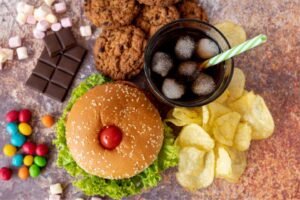
Sugary Foods and Beverages:
- Refined Sugars: Consuming foods high in refined sugars, such as candy, pastries, and soda, can lead to inflammation and suppress the immune system, slowing down the healing process.
- Artificial Sweeteners: These can cause digestive issues, which are best avoided during recovery.
Alcohol:
- Dehydration: Alcohol can dehydrate the body, which impedes healing and increases the risk of complications.
- Blood Thinning: Alcohol can thin the blood, increasing the risk of bleeding and bruising post-surgery.
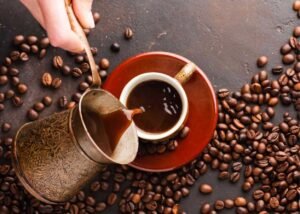
Caffeine:
- Increased Blood Pressure: High caffeine intake can raise blood pressure, which is not ideal during the healing process.
- Dehydration: Like alcohol, caffeine can dehydrate the body, hindering proper healing.
High-Fat Foods:
- Greasy and Fried Foods: These can cause gastrointestinal discomfort and are difficult for the body to digest, potentially leading to bloating and discomfort around the surgical site.
- Saturated and Trans Fats: Foods high in these fats, such as fast food and certain baked goods, can cause inflammation and slow the healing process.
Spicy Foods:
- Digestive Irritation: Spicy foods can irritate the digestive system and cause discomfort, which is best avoided when your body is focusing on healing.
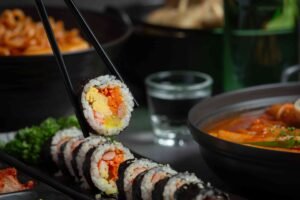
Raw and Undercooked Foods:
- Risk of Infection: Consuming raw or undercooked foods, like sushi or rare meats, can increase the risk of bacterial infection, which is dangerous post-surgery.
Carbonated Beverages:
- Bloating and Gas: These can cause bloating and gas, leading to discomfort in the abdominal area, which should be avoided after surgery.
High-Fiber Foods (Initially):
- Gas and Bloating: While fiber is essential for a healthy diet, consuming high-fiber foods immediately after surgery can cause gas and bloating. Gradually reintroduce fiber into your diet as you recover.
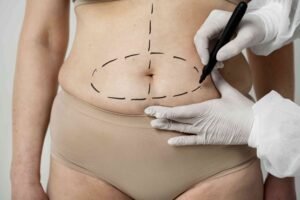
Conclusion
In conclusion, adhering to the right dietary guidelines after a tummy tuck is paramount to ensure a smooth and successful recovery. Avoiding certain foods that can cause inflammation, delay healing, or lead to discomfort is crucial in the post-operative period. By steering clear of processed foods, sugary treats, alcohol, caffeine, high-fat meals, spicy foods, raw and undercooked foods, carbonated beverages, and initially high-fiber foods, you can significantly enhance your recovery process.
Proper nutrition plays a vital role in providing your body with the necessary nutrients to repair tissues, reduce swelling, and prevent complications. It’s important to focus on a balanced diet rich in lean proteins, whole grains, fruits, and vegetables while staying hydrated to support your body’s healing mechanisms. Additionally, following your surgeon’s specific post-operative instructions, including dietary recommendations, will help you achieve the best possible results from your tummy tuck.
Remember, the journey to a flatter and more toned abdomen doesn’t end with the surgery itself. It requires dedication to a healthy lifestyle, including mindful eating habits, regular physical activity, and proper self-care. By making informed dietary choices and avoiding foods that can impede your recovery, you can enjoy the long-term benefits of your tummy tuck, feeling more confident and comfortable in your new body. Embrace this opportunity to adopt a healthier lifestyle and enhance the longevity of your surgical results, ensuring you look and feel your best for years to come.


